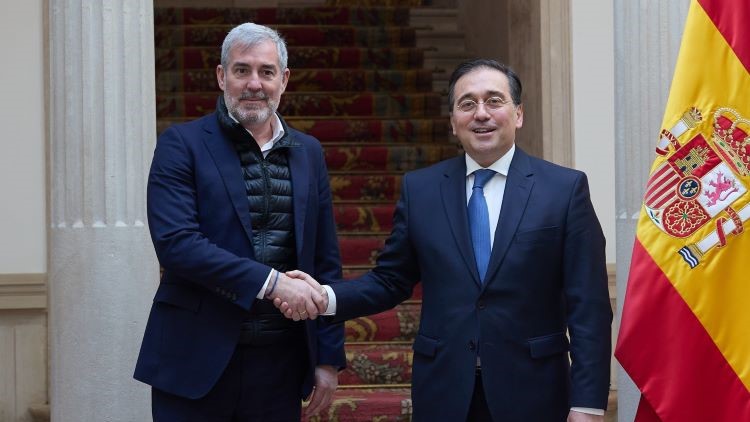Eduardo González
The Minister of Foreign Affairs, José Manuel Albares, held a meeting yesterday in Madrid with the president of the Canary Islands, Fernando Clavijo, with whom he discussed, among other matters, the military maneuvers of Morocco, contacts with the new Government of Senegal, the situation in the Sahel and the “intense migratory pressure” from West Africa.
During the meeting, according to the Ministry in a press release, Albares “detailed again to Clavijo the different aspects of the relationship with Morocco, including the military maneuvers.” On April 1, Albares had a telephone conversation with Clavijo in which he assured him that the military maneuvers carried out by the Royal Moroccan Navy just 125 kilometers from the coast of the archipelago (which began on March 29 and will be extended in different phases, until June 28) take place in “well-circumscribed areas and very far from Spanish waters.”
As reported by the Canary Islands Government in a press release, Clavijo urged Albares to improve the communication and coordination channels between both governments in the event of any alarming situation for the archipelago, “such as the recent military maneuvers carried out by Morocco in waters far from the Canary Islands, as we the minister confirmed today (yesterday),” according to the Canary Islands president.
In this regard, Albares “guaranteed” the regional president the presence of the Canary Islands “in all those forums that are established to address issues related to the archipelago” and both parties committed to establishing “a permanent channel of communication,” according to reports from the Ministry and the Canarian Government.
The announcement of the exercises by Morocco has sounded the alarm in the Canary Islands, particularly in the southern part of Fuerteventura, which is the area closest to these naval military maneuvers. Several Moroccan media have assured that the objective of the maneuvers is to “reaffirm Morocco’s sovereignty over the waters of the Sahara” after the decision of the Attorney General of the European Union to recommend the annulment of the fishing agreements with Morocco, considering that They violate the principle of self-determination of Western Sahara by not treating it as a “separate and distinct” territory from the kingdom of Mohamed VI.
Migratory pressure
On the other hand, Albares also addressed with Clavijo other issues of interest to the Canary Islands, such as the new stage of the Government of Senegal, the situation in the Sahel (after the departure of the European Union mission) and the migration problem.
In this regard, the Canary Islands president insisted that “only by improving the economy of the countries of origin of immigration will we be able to stop this diaspora” and expressed himself “satisfied because Madrid maintains a policy of control, despite the fact that the migratory pressure is intense from Senegal, Morocco and Mauritania.” “To the extent that we collaborate, we will be able to reduce that economic and knowledge barrier that exists between one side of the sea and the other,” declared Clavijo.
In addition, the Canary Islands president expressed his desire for the modification of the Immigration Law to materialize as soon as possible and for it to have its corresponding budget allocation, as the first vice president and Minister of Finance, María Jesús Montero, had assured him yesterday, “in order to be able to “to deal as a country with the care of unaccompanied minors, of which there are 5,500 boys and girls in the Canary Islands.”
Finally, Clavijo announced to Albares that, in the coming months, he will develop the institutional agenda in the countries of the area, which will include “a series of meetings with the ministries and ambassadors so that, together, we can contribute to the development of Africa and that its inhabitants have a chance for the future.”







